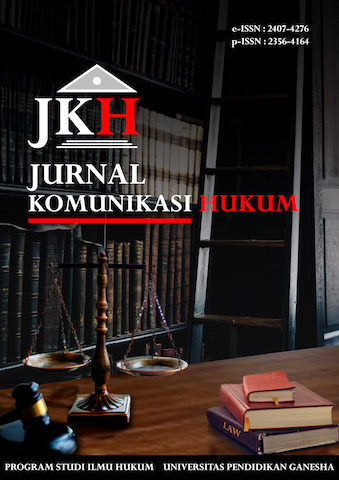PERAN HAKIM DALAM PENEGAKAN RESTORATIF JUSTICE MELALUI HUKUM PIDANA ADAT
DOI:
https://doi.org/10.23887/jkh.v8i2.51602Abstract
Article 18B paragraph (2) of the Constitution of the Republic of Indonesia provides recognition of laws that live and develop in society. One of the law enforcement officers who are given the authority to explore the values that live in the community, namely the Judge as regulated in Article 5 paragraph (1) of Law no. 48 of 2009 concerning Judicial Power. The values that live and develop in the community or better known as customary criminal law can be a way for judges to carry out restorative enforcement, so the role of judges is needed in assessing and considering the facts of case settlement outside the trial. This study aims to determine and analyze the role of judges in the enforcement of restorative justice through customary criminal law. This article is a normative legal research using a statutory and conceptual approach. The results of the study show that judges are facilitators and catalysts in the enforcement of restorative justice through customary criminal law in order to find a satisfactory solution to all parties as an effort to make peace between victims and defendants through customary criminal law that occurs outside the trial. Article 18B paragraph (2) of the Constitution Jo. Article 2 paragraph (2), Article 3 paragraph (2), Article 5 paragraph (1) of Law no. 48 of 2009 concerning Judicial Power and Article 5 paragraph (3b) of Law no. 1 of 1951 concerning Temporary Measures for Organizing Unitary Powers and Procedures for Civil Courts can be used as the basis for the application of customary criminal law as one of the efforts to enforce restorative justice.Judges as facilitators and catalysts in the enforcement of restorative justice through customary criminal law in order to find a satisfactory solution to all parties as an effort to make peace carried out by victims and defendants through customary criminal law that occurs outside the trial. Article 18B paragraph (2) of the Constitution Jo. Article 2 paragraph (2), Article 3 paragraph (2), Article 5 paragraph (1) of Law no. 48 of 2009 concerning Judicial Power and Article 5 paragraph (3b) of Law no. 1 of 1951 concerning Temporary Measures to Organize Unitary Powers and Procedures for Civil Courts can be used as the basis for the application of customary criminal law as one of the efforts to enforce restorative justice.
Downloads
Published
How to Cite
Issue
Section
License
Authors who publish with this journal agree to the following terms:- Authors retain copyright and grant the journal right of first publication with the work simultaneously licensed under a Creative Commons Attribution License that allows others to share the work with an acknowledgement of the work's authorship and initial publication in this journal.
- Authors are able to enter into separate, additional contractual arrangements for the non-exclusive distribution of the journal's published version of the work (e.g., post it to an institutional repository or publish it in a book), with an acknowledgement of its initial publication in this journal.
- Authors are permitted and encouraged to post their work online (e.g., in institutional repositories or on their website) prior to and during the submission process, as it can lead to productive exchanges, as well as earlier and greater citation of published work (See The Effect of Open Access).
Authors who publish with this journal agree to the following terms:
- Authors retain copyright and grant the journal right of first publication, with the work [SPECIFY PERIOD OF TIME] after publication simultaneously licensed under aCreative Commons Attribution License that allows others to share the work with an acknowledgement of the work's authorship and initial publication in this journal.
- Authors are able to enter into separate, additional contractual arrangements for the non-exclusive distribution of the journal's published version of the work (e.g., post it to an institutional repository or publish it in a book), with an acknowledgement of its initial publication in this journal.
- Authors are permitted and encouraged to post their work online (e.g., in institutional repositories or on their website) prior to and during the submission process, as it can lead to productive exchanges, as well as earlier and greater citation of published work (See The Effect of Open Access).












